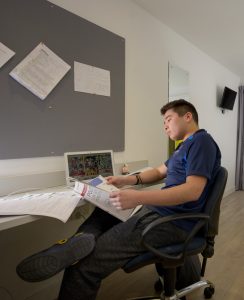by Paul Templar
Experienced teacher and lecturer in Business, Economics and Sociology
Posted March 2023
Given that many students at all levels including GCSE, A Level and above may have not sat many examinations due to COVID Lockdown, getting into the practice of managing your revision studies and preparing for your exams may be somewhat alien to you. With the competitive employment we currently have it is important that you do the best you can in your exams to give you the best opportunity to progress in the career you want. But do you know how to prepare. Here are some tips to help you get it right. I have identified 3 key areas to help with that preparation.

Typical youngsters do not live and work in a pristine and tidy environment at home. The living environment is usually shared with siblings and even pets. Although we know that dogs can aid well-being, they may disturb any revision practice. Moreover, many students’ bedrooms have lots of posters and other artefacts strewn across floors and table surfaces. Neither of these are really that suitable for a learning and revision environment. So, with the living environment, if this is all you have, work with the family to tidy up and lose all unnecessary items so that there is nothing about to disturb you.
If you have to use the dining room or kitchen table, make sure that it is clean after use and free of any dining or food preparation equipment: you need a clear space to put all your books, notes and writing equipment and even the laptop to do additional research in case you have completely forgotten something. Also ensure that you will not be distracted by such things as televisions and these being on when you are trying to revise will only act as a distraction. Also, for me, the notion of listening to music only acts as a distraction, so my advice is to put these well out of reach.

Then there is the bedroom. Some lucky students will have use of a work table in the bedroom. As with the dining room or kitchen this needs to be clear of anything other that the books, notes and laptop needed to revise effectively. But there is more, and you will have a few weeks to get this sorted before those exams. Walls need to be clear of unnecessary distractions. My advice, if it is possible is to redecorate in time for the revision period: just a coat of paint may be sufficient. But then, I always suggest that when covering certain topics, is to make posters, flowcharts and diagrams of the important concepts that you may have difficulty with. These can be blu-tacked to walls and wardrobes for the revision and exam period. One, just creating these can act as good revision, but also, two, you can just glance at them every now and again and this may act as the only revision you need to grasp such concepts.
This may be different for different students. Not so much to do with preferred learning styles, but what works best for you. You should all have your text books and notes from classroom studies and this should form the basis of your initial planning. Your teachers should have reinforced the notion that the best revision happens when you are in the process of learning the topics in the classroom. Some of you may have had to undertake remote learning or self-directed learning which is not ideal. Did you take notes during these sessions, or do you have access to videos. In the first case, you just may have to do the activities in section 3. If you only have the videos to use, you will have to review these and make the notes you should have made during the original learning sessions. If you have none of this, you need to undertake the self-directed learning that should have been done. If you have access to the text books, good. BBC Bitesize is a good starting point for GCSE students, or if you have not got access to the course textbook and are low on funds to buy one, GCP books are a good starting point for both GCSE and A level.
But even before you start to revise, it is good practice to create a revision timetable, although I am aware that some students do well without the need for this, but then, they have made comprehensive notes during their learning sessions in the first place. But what you may not realise is that the process of creating a revision timetable gets students in the mood to revise, it gives them the impetus to start the revision process itself – it changes the mindset. In doing so it is likely to set goals which is known to be a key motivator.
When planning your revision schedule ensure that you have a balance. We are aware from years of research that focusing on one subject per day is rarely effective. It is also imperative that you do not schedule your revision for the whole day without any breaks. It is also inadvisable to focus on one subject per day. This all links to the Revision and Learning Practice coming next.
With your revision schedule remember to break up into sections and develop which days and part of the day you will be doing specific subjects. Morning can be one subject, the afternoon another and early evening another. Splitting up the day into subjects actually frees up the unconscious brain which works in the background and can inject ideas in the conscious brain when you return to that subject – the eureka notion if you will.
The first imperative is to be fully prepared for the day of revision. Ensure that you have days planned. This means going to bed at a suitable time, not at 12 o’clock after an evening watching TV or playing computer games regardless of how much you enjoy them. The sacrifice is for the benefit of your career!!!
Doing the above is not the only time management factor here. You need to ensure you eat well. This is not just good and healthy food, although we know that nutrition aids the brain so that it is prepared for, often intense, periods of learning – for this is what revision will be. You need to factor in rest periods and periods where you may be doing something completely different which not only acts as a necessary break from the intense revision, which relieves some of the stress that may have been built up, but also helps you relax. This is where your dog can come in useful. We know that a dog can act as a counter to the intense revision, but given that we call dogs mans best friend, they can also lift your mood and act as a good distraction. As such, it is often advised to take the family dog for a walk. Why not do this with the neighbours or other family members.
Now we come to the revision itself, and the preferred learning styles. Be careful with the preferred learning styles and the preferred bit is often ignored. One style is not going to be sufficient; you need to incorporate all 3: Visual, Auditory and Kinaesthetic. Visual comes from you reading your notes or reviewing the text in the textbooks. It also relates to reviewing diagrams and charts. Auditory relates to hearing things. Luckily many subjects have short videos plastered over the Internet. You just need to remember and realise that not all websites are good for learning. Your teacher should have directed you to specific websites, if not then ask your teacher before you go on study leave. Kinaesthetic tends to be explained as a mix of all other learning styles but can be summarised in the term ‘doing things’. This usually relates to craft or physical activities, such as carpentry or needlework and music. However, just think about the term ‘doing things’. At a push I would consider this to be writing. Making notes is a physical activity and I always maintain that this physical activity supports learning and compliments the other two main learning styles. There is some debate whether typing notes on a computer acts as kinaesthetic learning. I am not sure, but not going to discount this until the research proves one way or another.

So how do we make notes. Well, many of you will have pages and pages of notes. It can be argued that this will be far too much to take in during revision. My thoughts are that you can make notes on those notes. In doing so you will be revising but will be incorporating at least two learning styles in the process and, as such, are likely to remember the subject content in a far better way.
But how do you make those notes? I know lots of students use post cards to write definitions and key points. Some even post questions on one side, with answers on the other. The added benefit here, is that they can be used with other students (friends) doing the same subject in quiz like activities. This works really well. Personally, I make notes on notes, then make notes on those notes so end up with 3 or 4 sides of A4. Also, when doing this, if I forget something it gives me the opportunity to go back to my original notes.
Some other students may want to try alternative strategies. MindMaps and Spider Diagrams can work well, although I am personally a List person. Just be careful with these though. MindMaps are the current preferred notion. But these should include small images, and then, students need to consider a colour scheme to link key points with definitions, then explanations and other real-life examples. Remember, if you want to get top marks in most subjects you need to relate, in answers, something in the case study, so you need to cover real life examples.
The other key point I want to make is for higher level students is when you photocopy from course designated textbooks in libraries. Yes, you will read these texts. But is reading the text sufficient. Learning practice will say no. But many then tend to use a highlighter to highlight key text. This has been shown to be ineffectual. Guidance here is to not just highlight, but to make notes in the margins or in spare space on the photocopied document as the writing itself reinforces learning. But you can also look back and see what your understanding of the text really was.
Best of luck with your revision and exams.
Subscribe today for the latest news and updates
Oxford Science Studies is a trading name of Fieldwork Education Ltd, Registered Company Number 03299897.
Copyright @ 2024 Nord Anglia Education
Nord Anglia Education
4th Floor, Nova South
160 Victoria Street
London, United Kingdom
SW1E 5LB
+44(0)207 131 0000
enquiries@nordanglia.com